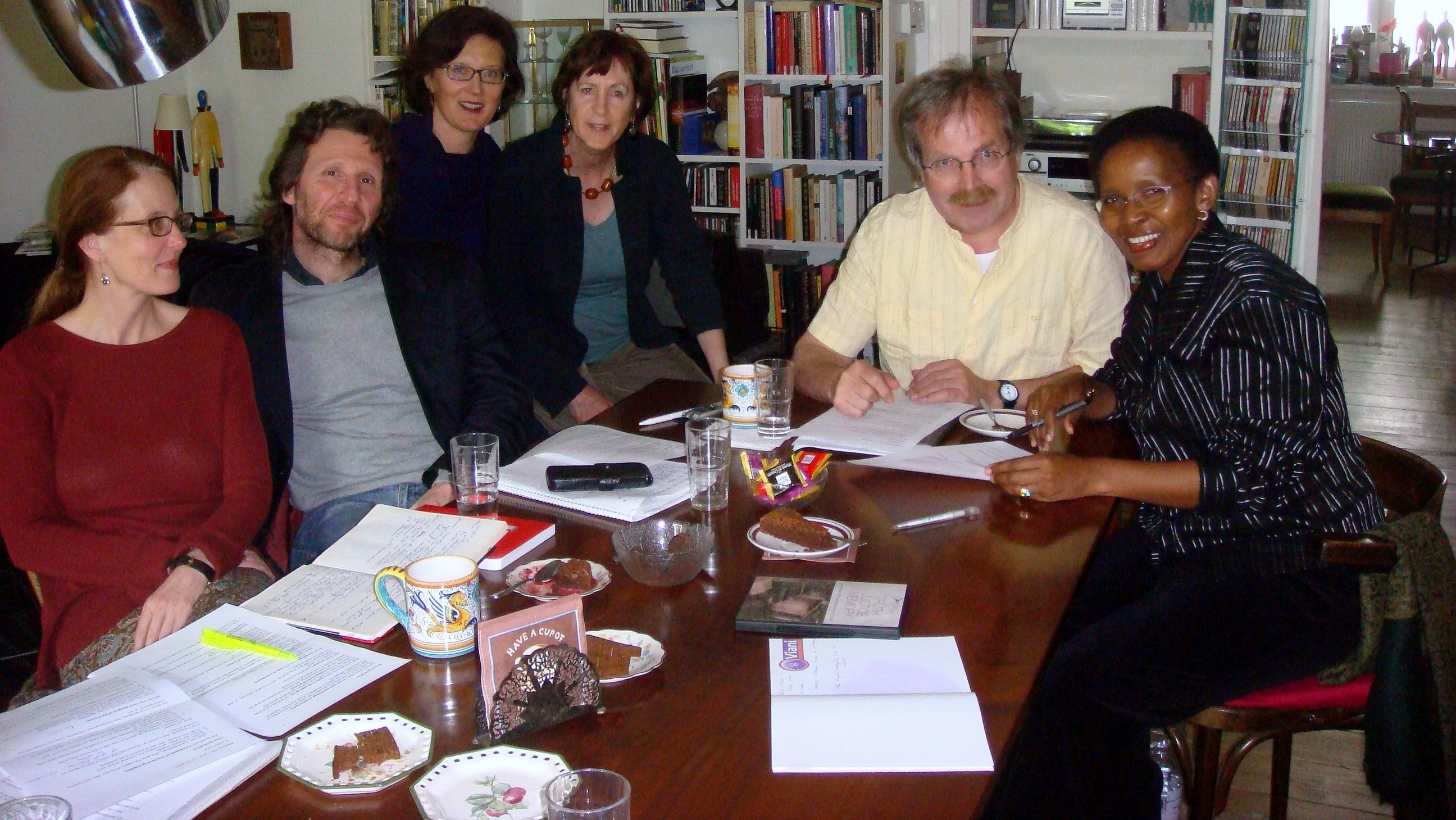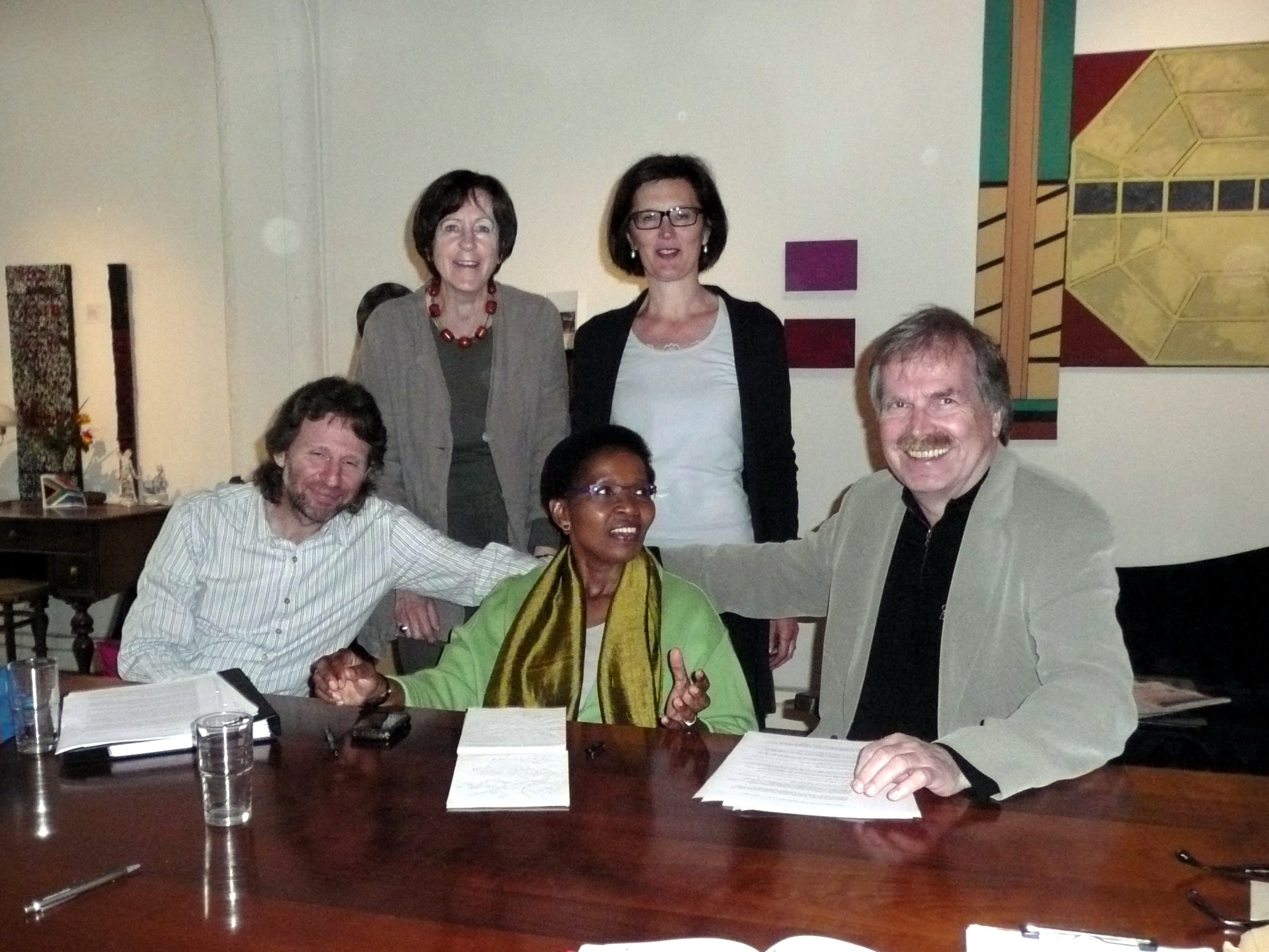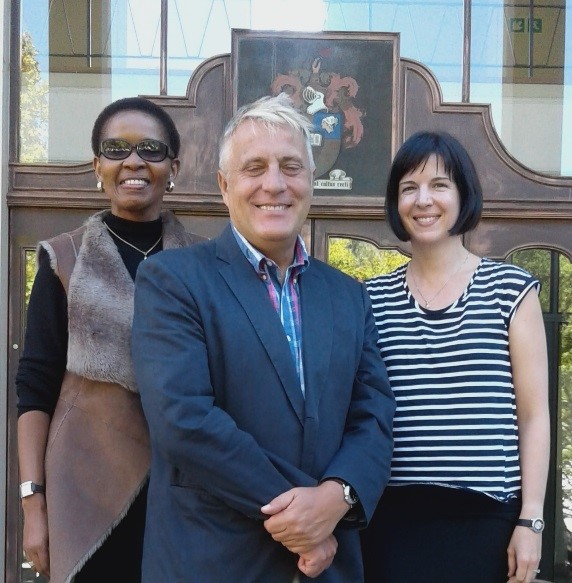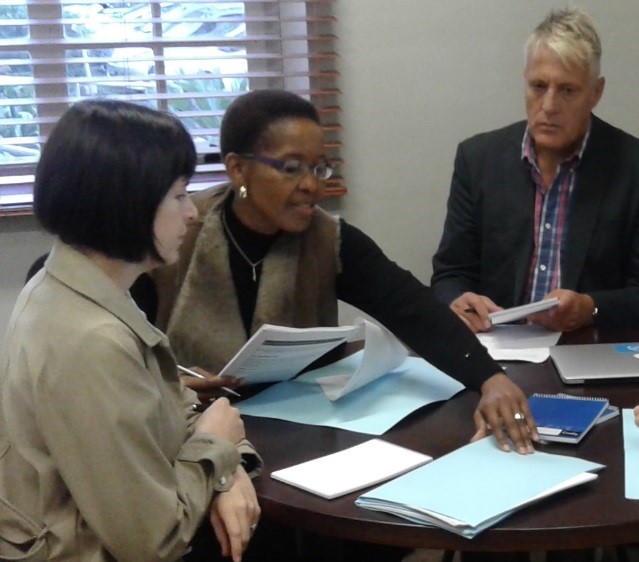1. Trauma, Memory and Representations of the Past
Principal Researcher: Pumla Gobodo-Madikizela
Research Partners: Friederike Bubenzer is Leading Partner at Institute for Justice and Reconciliation (See profile under
Institutional Partners )
How do societies characterised by a history of mass violence work through their traumatic past? In the aftermath of gross human rights violations and genocide, and when people have suffered collective trauma, how does the trauma play out in subsequent generations, and how might we map out the arc of historical trauma as a nexus for the interweaving of individual and collective traumatic memories?
Trauma, Memory and Representations of the Past, a project funded by the Mellon Foundation, was established to address these questions.
More information on the website of this project:
http://trauma-memory-arts.org.za/
2. Narratives of Transformation Project
Principal Investigator: Pumla Gobodo-Madikizela
Co-Investigator: Kim Wale
The objective of the study is two-fold. Firstly, it seeks to examine how change comes about, and how transformation emerges in the context of dialogue or other similar process in encounters between adversaries. Secondly, we are interested in a more social and relational account of these encounters as a fulcrum for explaining the human action that unfolds when people from different sides of violent historical pasts and oppression encounter each other. Ultimately, the study will open up new avenues of inquiry and provide a basis for comparative analysis of the successful strategies that have helped to interrupt the cycles of inter-group hatred that so often repeat themselves in post-conflict societies. The data for this research was collected from residences at the University of the Free State.
3. Exploring Empathy in Jewish-German Dialogue
Co-Investigators: Pumla Gobodo-Madikizela and Members of the Study Group on Intergenerational Consequences of the Holocaust (PAKH)
This collaboration involves research on the process of dialogue and how empathy emerges as a central trope in the transformation of relationships between descendants of survivors of the Holocaust and Germans born after the end of WWII. We are completing a manuscript for a monograph of this research. The monograph is based on the analysis of naturally occurring series of dialogue interactions over several years. The participants in the extensive dialogue process are either descendants of survivors of the Holocaust, or Germans who have no conscious memory of the Hitler era, but who are living with the burden of being children of parents implicated in the history of Nazism. All are members of the
Study Group on Intergenerational Consequences of the Holocaust (also known as
PAKH) The critical analysis in the monograph provides a close examination of the process of dialogue among members of PAKH, exploring how Holocaust trauma lives in the "everyday" lives of descendants of survivors, and how both destructive and restorative elements emerge in the context of the dialogue. Taking as its vantage an autobiographical narrative perspective, the monograph explores the intersection of history, trauma and shame, and illuminates moments of empathy in the dialogue and how change and transformation unfolds over time. Going beyond the usual "intergroup" perspective that characterises most dialogue initiatives aimed at reconciliation, this book looks at the complicated nature of dialogue, and shines the spotlight on both the internal (intrapsychic) dynamics that play out among the participants in the course of the dialogue, and the external and discursive aspects of the dialogue.


From Left, Dr Elke Horn, Dr Peter Pogany-Wnendt, Beate Hammerich, Pumla Gobodo-Madikizela with PAKH members. Erda Siebert, Dr Johannes Pfafflin
4. Empathy: The Phenomenology and Neuroscience of Care and Solidarity
Co-investigators: Pumla Gobodo-Madikizela; Melike Fourie
Research Collaborators: Jean Decety; Philip Nel; Kim Wale

Both popular and academic analysis demonstrates that South African society is currently facing a political and moral crisis. Despite the legacy and ideal of reconciliation which helped birth the new democracy, this ideal does not seem to have filtered down into the everyday experiences of race in South Africa. The concept and practice of reconciliation as demonstrated through the Truth and Reconciliation Commission (TRC) also presented South Africans with an ethical framework for how to rebuild relationships after the destruction caused by apartheid segregation and dehumanization. Nationally South African society is struggling to find a constructive ethical framework which may guide the efforts of those who wish to make society more just. This research aims to research Ubuntu philosophy both a system of knowledge and as a way of being-in-the-world. It further aims to cultivate Ubuntu philosophy into an ethical and practical framework for South African society by developing and testing a transformation intervention based on the insights gleaned from research into this philosophical and practical worldview.
The concept of ‘Ubuntu’ is not just an ethical idea, but an embodied way of being in the world that is learnt through practice. A person with Ubuntu is open and available to others, affirming of others, does not feel threatened that others are able and good, for he or she has a proper self-assurance that comes from knowing that he or she belongs in a greater whole and is diminished when others are humiliated or diminished, when others are tortured or oppressed, or treated as if they were less than who they are.
The concept of Ubuntu contains an understanding of human relatedness which goes beyond the dominant psychological constructs of ‘empathy’, ‘care’ and ‘solidarity’. Many of these constructs, especially in the field of neuropsychology bring with them a view of what it means to be human that differs from the view of humanity contained in the concepts of Ubuntu. For example, the notion of empathy reflects an individualistic view of relationships as a process which occurs between two individuals. However, Ubuntu speaks more to the collective connections that hold us together as belonging to a human community. The concept of Ubuntu challenges this distinction between care and solidarity, as it imagines a form of being together that is also ‘friendly, caring and compassionate’. Thus the philosophy of Ubuntu has much to offer the field of psychology in deepening the understanding of what it means to belong to a common humanity and to South African society in general.
This project aims to explore the philosophy of Ubuntu with a focus on the ontologies of care contained within the lived experience and practice of this philosophy. It further aims to bring this philosophy into critical conversation with the dominant paradigms of Western psychology and in doing so to develop and test a transformation intervention which is contextually relevant.

 s
s
Prof Decety with Melike Fourie, Pumla Gobodo-Madikizela Prof Decety Research Visit

Prof Phillip Nel, Research Consultant for the Empathy and Ubuntu Project
5. Empathy in response to forgiveness and remorse: A Neuroimaging study
Principal Investigators: Melike Fourie (SU), Pumla Gobodo-Madikizela (SU)
Collaborators: Jean Decety (Chicago University), Dan Stein (UCT), Mark Solms (UCT)
This study examined empathic responses of Black and White South African adults from the general population in response to video-footage from the South African Truth and Reconciliation Commission (TRC) hearings. Specifically, video clips portrayed Black and White victims of apartheid violence either showing forgiveness or not, or perpetrators of that violence either showing remorse or not. Participants' level of everyday discrimination was also recorded to examine possible associations with empathic response in historically oppressed/disadvantaged versus unoppressed/advantaged groups.
6. Intergroup empathic failures in response to complex narrative videos
Principal Investigator: Melike Fourie (SU)
Collaborator: Emile Bruneau (University of Pennsylvania)
The current project seeks to examine empathic failures between White and Black South Africans using ecologically valid, complex narrative video stimuli. Specifically, to better characterize neural mechanisms underlying implicit empathic biases, we want to analyze neural activation patterns over time using intersubject correlation (ISC) analysis. This will allow us to extend previous research by using engaging visual narrative stimuli to examine empathic responses over time and in racial groups characterized by historical conflict. The project will also implement an intervention aimed at increasing intergroup empathy to investigate its potential in mitigating between-group differences in neural activation.
7. South African Workplace Transformation Project
Collaborators: Melike Fourie (SU), Hermann Swart (SU), Kim Wale (SU), Miles Hewstone (Oxford University)
South African society is currently facing a political and moral crisis. Despite the ideals of reconciliation and forgiveness that helped birth the new democracy, notions of equality do not seem to have filtered down into the everyday experiences of race in South Africa. Instead, our current reality is fraught with racial tensions, increasing economic inequality and geographic segregation, and our identity politics seem more problematic than in 1994. The present study seeks to explore South African racial (as well as gender) dynamics in the context of the workplace and against the backdrop of the institutional transformation goals. Both quantitative and qualitative measures will be employed to assess how transformation is experienced within a population of (at least theoretically) economically empowered people, what role the workplace plays in terms of promoting social cohesion and/or reducing stereotypes, and the role of intergroup contact in mediating these effects.
8. Predictors of intergroup outcomes and conflict in the South African context
Principal Investigator: Melike Fourie (SU)
Collaborator: Emile Bruneau (University of Pennsylvania)
This research explores some of the psychological processes that appear to be driving intergroup conflict and hostility in South Africa. Specifically, survey measures are employed to assess potential predictors of negative outgroup responses in terms of support for collective action in a large South African sample of Black, White, and Coloured participants. Measures assessed include collective blame of outgroup individuals, dehumanization and meta-perceptions of outgroup dehumanization, and parochial empathy (i.e., empathy felt for members of one's own group versus members of the outgroup). A secondary aim is to compare responses intergenerationally, that is, between an older apartheid generation and younger members of the population that were born post-apartheid.

